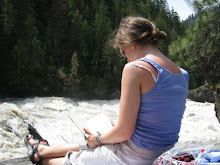C'mon Good Food Store... really?
To begin with, I have a hard time believing goldfish crackers qualify as "good food". Yes, they are better for you than Cheetos or Doritos, but they are still owned by Campbells, produced industrially and covered in cheese powder. I could buy them at any grocery store in Missoula.
I'll admit it, I like the taste of goldfish crackers. I'm sure many other shoppers (and their children) do too. However, one of the big reasons I shop in bulk is to reduce the amount of packaging associated with my food. Tearing apart a carton only to use another package (often a plastic bag) to take the product home with me seems counterproductive. Why not just stock it and buy it in the carton to begin with?
Overall, I think the Good Food Store is great. In seasons when farmers markets and CSA's are nonexistent in Montana, it offers local, regional, and sustainably produced food. It is a relatively mainstream way for Montana consumers to move toward food consumption that is more connected to the farmers, healthier for the planet and healthier for their bodies.
However, just because the title says "Good Food" doesn't mean you can turn your brain off when you walk in the doors. It is important to ask yourself, "why am I willing to pay more for this food?" Maybe it is for environmental reasons. Maybe it is to support local and regional food producers. Maybe it is for health purposes. Maybe it is because it simply tastes better.
I have been trying to go through a mental checklist before I put food in my grocery cart. I ask myself
- Where was this made or grown? Who am I supporting by making this purchase?
- How much fossil fuel did it take to ship it here?
- How much packaging does it have? What type of packaging is it? Is it reusable or recyclable?
- How much has this food already been processed?
- What is the nutritional value?

No comments:
Post a Comment